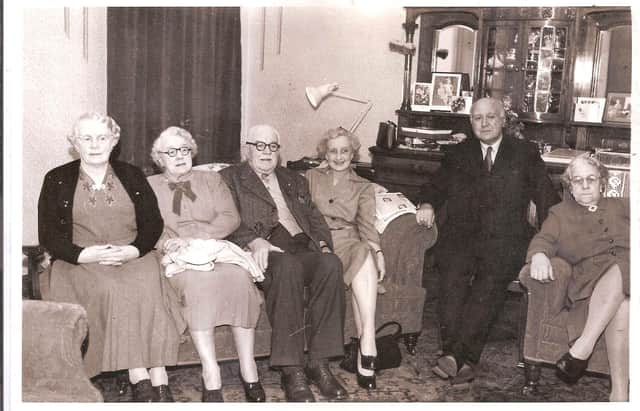Nostalgia with Margaret Watson: Letters and photographs must be preserved for future generations to enjoy


Margaret Watson writes: Children will be told at school of the primitive way in which their ancestors used to communicate by pen and paper which they’ll say was not good for the planet.
Indeed the seeds have already been sown for such a scenario one day, and if you doubt me, ask your grandchildren when they last wrote a letter.
Even vocal communication has been drastically reduced since the introduction of texts, something people see as speedier and cheaper than speaking on the phone.
At this rate we’ll soon be losing the art of conversation as well as the art of writing, no wonder there is already talk of young people these days not having social skills.
Some years ago, I came into possession of an album containing photographs and letters belonging to an old friend of mine, Miss Muriel Hirst, who has since passed away.
They made me realise how important it is that we carry on writing letters and taking proper photographs instead of sending messages by e-mails and attaching photographs from mobile phones, which get deleted and lost forever.
Muriel was my old boss when I first went to work at the Reporter over 50 years ago and I learned a great deal from her, especially about her father who ran an accountancy business in nearby Bond Street.
She was an only child who had come into journalism late in life, having spent her earlier working years as a domestic science teacher.
Never having married and not having any brothers and sisters, Muriel’s life revolved around her parents and her aunts and uncles, as could be clearly seen from the many photographs in her album.
The photograph shown above was just one which Muriel took of family get togethers, this one having been taken at a family gathering in the 1950s.
Her father was someone she looked up to all her life and she heeded his advice on all things. His death not long after this picture was taken, had a profound effect on her.
She saved many of his letters, sent while she was at college and later when she became a teacher, two of which I publish below.
The letters were written 90 years ago in beautiful copper-plate handwriting and they are a joy to read, giving information which, if sent by e-mail, would have been long gone.
Today they are part of social history, a glimpse into the lives of people who were once an important part of the thriving middle-class community which existed in Dewsbury at this time.
I also believe the photograph above speaks volumes of the days when the extended family was included in everything, aunts and uncles as well as mothers and fathers, sisters and brothers.
Muriel’s family lived in a grand Victorian house in West Park Street, Dewsbury, and her father, who she called “daddy” all her life, had his own accountancy business in Bond Street.
The letter below was written by Mr Hirst to Muriel in 1928, during half-term while she was studying at college.
His wife Mabel had gone down to Plymouth to stay with their daughter, leaving Mr Hirst at home to fend for himself. No wonder he sneaks off to Megson’s famous cafe in Dewsbury for sustenance!
He writes:
My darling Muriel,
I was delighted to get your little note, and I have also got a letter-card from your mother, who tells me that you are looking wonderfully well.
I am not (as you possibly feared) having breakfasts on water biscuits, because, between you and I, I have found a splendid place for breakfasts and teas, at Megson’s.
Each morning they provide me with coffee and eggs and some of the finest home cured York ham. So you need not be anxious about me.
Well dear, I must now close, and I send you my warmest affection, and love, and every good wish for your happiness.
From,
Your loving Dad.
In another letter following Muriel acquiring a position as a domestic science teacher in Plymouth, Mr Hirst refers to a day out he and Muriel’s mother had with her two young cousins, who he refers to as “the boys”.
He writes:
My darling Muriel,
Many thanks for your delightful letter and birthday present, and I thank you for your good wishes which I much
appreciate.
Auntie Florrie and the boys are back at the villa, but I do not think that Auntie Florrie is too well, and she is talking of going back to India in September, which to me is utter foolishness, to go back and damage her health.
She is torn between her duty to her husband, and children, to say nothing of her own health; however, she will do what she thinks best.
By the way, I got another present from your mother of a beautiful shaving brush, and I was also given some new collars and handkerchiefs. I shall be rather interested to know how you get along, teaching boys how to cook and sew on buttons.
Yesterday, we took the boys and their mother for a run to Golden Acre Park, where the youngsters had a good time on the miniature railway and the mono-rail.
We then went on to Almscliff Crag, where they enjoyed themselves, climbing over the rocks, and later regaling themselves with the usual ice cream and lemonade, until when we got to Harrogate and went into Taylor’s restaurant for tea.
We then came back through Wetherby and Leeds where the boys could see the decorations for the Jubilee celebrations, which were very good. The decorations in Dewsbury are also very gay.
I will now close this letter, with my best love which I send you, and hope that you will be very happy and keep well and come back to us, as sweet and lovely as you always are to your affectionate Dad.